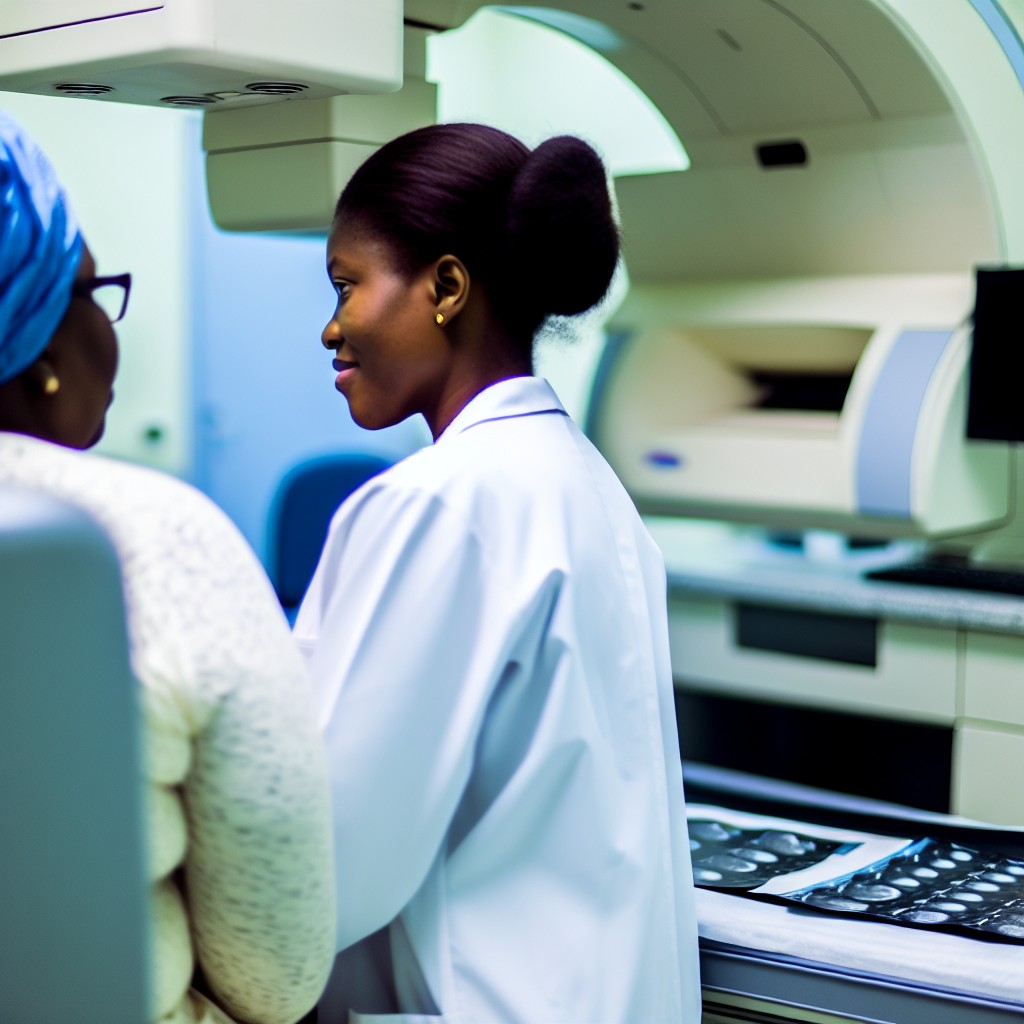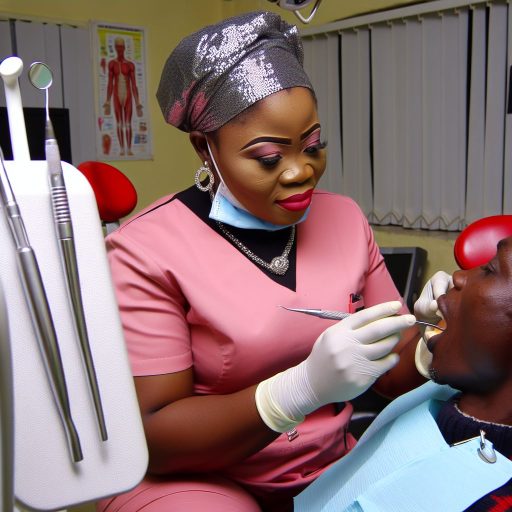Introduction:
Radiographers play a crucial role in patient care in Nigeria by conducting diagnostic imaging procedures.
Their role is vital in providing accurate and timely diagnosis, which is essential for effective treatment.
Radiographers make a significant impact on patient care in areas such as radiography, CT scans, and MRI.
Training and Education of Radiographers in Nigeria:
Radiographers in Nigeria undergo rigorous training and education requirements to attain certification.
To become a radiographer in Nigeria, one must complete a Bachelor’s degree in Radiography.
Radiographers also receive specialized training in radiation safety, anatomy, physiology, and imaging techniques.
Continuous learning is essential for radiographers to stay updated with technological advancements in imaging.
Radiographers in Nigeria are required to participate in regular professional development programs to maintain their certification.
Specialized Skills and Knowledge of Radiographers:
Radiographers possess specialized skills in operating imaging equipment such as X-rays, CT scans, and MRI machines.
They have in-depth knowledge of human anatomy and physiology to accurately capture diagnostic images.
Radiographers understand the principles of radiation protection and ensure patient safety during imaging procedures.
Radiographers also have the ability to communicate effectively with patients to ensure high-quality care.
Their expertise in image interpretation helps radiologists and other healthcare professionals make accurate diagnoses.
Importance of Continuous Learning and Professional Development:
Continuous learning is crucial for radiographers to keep up with advancements in imaging technology.
Professional development programs help radiographers enhance their skills and stay current with best practices.
Ongoing education ensures that radiographers provide high-quality care and accurate diagnostic imaging.
By staying informed about the latest techniques and equipment, radiographers can improve patient outcomes.
Continuous learning and professional development demonstrate radiographers’ commitment to excellence in patient care.
Radiographers’ Role in Diagnostic Imaging:
Radiographers conduct medical imaging procedures with precision and accuracy.
Accurate and timely diagnostic imaging is crucial for effective patient care.
Radiographers assist physicians in diagnosing and treating various medical conditions.
Radiographers are essential members of the healthcare team.
They play a crucial role in conducting various medical imaging procedures.
Their expertise and skills contribute significantly to the accurate diagnosis and treatment of patients in Nigeria.
In this section, we will delve into the significant impact of radiographers on patient care in the country.
Diagnostic imaging is a critical component of modern healthcare.
This provides valuable insights into the patients’ conditions.
It guides healthcare providers in making informed decisions regarding their treatment.
Radiographers are at the forefront of this process.
They utilize advanced imaging technologies to capture internal images of the body.
This aids in the diagnosis and management of various medical conditions.
One of the primary responsibilities of radiographers is to ensure that diagnostic imaging procedures are conducted accurately and in a timely manner.
This is essential for providing healthcare providers with the necessary information.
It helps diagnose and treat patients promptly.
By performing these procedures with precision, radiographers improve patient outcomes and overall healthcare quality.
Moreover, radiographers play a crucial role in assisting physicians in interpreting imaging results.
They identify abnormalities or abnormal conditions.
They work closely with radiologists and other healthcare professionals.
This collaboration ensures that the images captured are of high quality.
It provides the necessary information for accurate diagnosis and treatment planning.
Transform Your Career with Expert Guidance
Get personalized mentorship consulting that’s tailored to your unique path. Our expert advice is actionable and exclusive.
Get StartedThis collaborative effort enhances the overall efficiency of the healthcare system.
It contributes to better patient care outcomes.
Additionally, radiographers’ role in patient care extends beyond conducting imaging procedures.
They also play a vital role in ensuring patient safety during imaging examinations.
Maintaining equipment quality is also a key part of their responsibilities.
They provide necessary support to patients throughout the imaging process.
Their expertise and attention to detail help create a safe and comfortable environment for patients.
This further enhances the overall patient experience.
Radiographers are integral to the diagnostic imaging process.
They have a significant impact on patient care in Nigeria.
Their expertise, skills, and dedication contribute to the accurate diagnosis and treatment of various medical conditions.
This ultimately improves patient outcomes and healthcare quality.
As key members of the healthcare team, radiographers continue to advance healthcare services and ensure the well-being of patients across the country.
Discover More: Child Development Milestones in Nigeria
Patient Safety and Care:
Ensuring patient safety is a top priority for radiographers in Nigeria.
They take several measures to guarantee the well-being and comfort of patients during imaging procedures.
These measures are crucial in providing quality healthcare services.
- Radiographers meticulously follow safety protocols to minimize radiation exposure to patients.
- They verify patient identification and medical history to prevent errors during imaging.
- Radiographers ensure proper positioning of patients to obtain accurate diagnostic images.
- They use lead aprons and shields to protect patients from unnecessary radiation exposure.
- Regular maintenance and calibration of imaging equipment are done to ensure accurate results.
Effective communication and patient education are essential aspects of radiography practice in Nigeria.
Radiographers emphasize the importance of clear and concise communication with patients to address their concerns and ensure cooperation during imaging procedures.
- Radiographers explain the imaging process to patients to alleviate anxiety and fear.
- They provide instructions on how to prepare for specific imaging tests to enhance efficiency.
- Clear communication helps in obtaining accurate medical histories and ensuring patient compliance.
- Patient education on radiation safety and potential risks associated with imaging procedures is crucial.
- Empowering patients with knowledge enables them to make informed decisions about their healthcare.
Ethical considerations play a vital role in patient care provided by radiographers in Nigeria.
Adhering to ethical standards ensures trust, confidentiality, and respect in the patient-radiographer relationship.
- Radiographers respect patient confidentiality and privacy at all times.
- They obtain informed consent from patients before performing any imaging procedures.
- Ensuring patient autonomy and dignity is a fundamental ethical principle in radiography practice.
- Radiographers maintain professional boundaries and uphold ethical conduct in patient interactions.
- Upholding ethical standards contributes to fostering a culture of trust and integrity in patient care.
Patient safety, effective communication, and ethical considerations are integral components of radiography practice in Nigeria.
Radiographers play a critical role in ensuring the well-being and satisfaction of patients.
They uphold ethical standards and promote quality healthcare delivery.
You Might Also Like: Anesthesia in Oral Surgery: Nigerian Practices
Collaboration with Healthcare Team:
Radiographers collaborate with healthcare professionals to ensure comprehensive patient care.
Teamwork and communication are essential for effective collaboration among different healthcare professionals.
Successful interdisciplinary collaborations in patient care improve outcomes and quality of care.
Effective collaboration with other healthcare professionals is crucial for radiographers to provide comprehensive care to patients in Nigeria.
Radiographers work closely with a team of healthcare professionals, including radiologists, physicians, nurses, and other allied health professionals, to ensure that patients receive the best possible care.
Communication among team members is essential to ensure that all healthcare providers are on the same page regarding the patient’s condition, treatment plan, and ongoing care.
Radiographers play a crucial role in facilitating communication between different healthcare professionals by providing accurate and timely information about imaging findings, patient history, and treatment plans.
In Nigeria, successful interdisciplinary collaborations have been instrumental in improving patient outcomes and quality of care.
For example, radiographers work closely with radiologists to ensure accurate interpretation of imaging studies and communicate findings to other members of the healthcare team.
This collaboration helps physicians make informed decisions about patient care and treatment options.
Furthermore, radiographers collaborate with nurses to ensure that patients receive appropriate care before, during, and after imaging procedures.
By working together, healthcare professionals can identify potential risks, address patient concerns, and provide necessary support to ensure a positive patient experience.
Overall, collaboration with the healthcare team is essential for radiographers to deliver quality care to patients in Nigeria.
By working together, healthcare professionals can leverage their unique skills and expertise to provide comprehensive and patient-centered care that meets the diverse needs of patients in various clinical settings.
Learn More: ENT Surgery and Lifestyle Changes Post-Operation

Utilization of Technology in Radiography:
Radiographers in Nigeria are utilizing advanced technology and equipment to enhance diagnostic imaging procedures.
- They use state-of-the-art machines like CT scanners, MRI machines, and X-ray machines to generate high-quality images.
- These technologies help in detecting and diagnosing various medical conditions accurately and promptly.
- The use of technology has significantly improved the efficiency and speed of radiography practice in healthcare settings.
The Impact of Technology on Radiography Practice:
Technology has revolutionized the field of radiography in Nigeria, leading to improved accuracy and patient care.
- Advanced imaging technologies allow for more precise diagnosis, leading to better treatment outcomes for patients.
- Radiographers can now conduct imaging tests faster, reducing patient waiting times and improving overall efficiency.
- Technology has enabled radiographers to share images digitally with other healthcare professionals for better collaboration.
The Importance of Staying Updated on Emerging Technologies:
It is crucial for radiographers in Nigeria to stay abreast of emerging technologies in the field to deliver optimal patient care.
- Continuous education and training on new equipment and software are essential to ensure competency and safety.
- By staying updated, radiographers can provide patients with the most advanced diagnostic services available.
- Adapting to emerging technologies also helps radiographers in keeping pace with advancements in healthcare practices globally.
The utilization of technology in radiography has significantly enhanced the quality of patient care in Nigeria and has become an indispensable part of modern healthcare practices.
Delve into the Subject: Blood Bank Services and Availability in Nigeria
Identifying the Challenges Faced by Radiographers in Nigeria:
- Resource Constraints
- Workload
- Infrastructure Limitations
Radiographers in Nigeria often face challenges due to limited resources such as outdated equipment, insufficient supplies, and lack of access to cutting-edge technology.
These constraints can hinder their ability to perform their duties effectively and provide accurate diagnostic services to patients.
Another major challenge faced by radiographers in Nigeria is the overwhelming workload.
Due to the shortage of radiography professionals in the country, radiographers often have to handle a high volume of patients.
This leads to increased stress and burnout.
This can impact the quality of care provided to patients and result in errors or delays in diagnosis.
Radiographers in Nigeria also encounter challenges related to infrastructure limitations.
Many healthcare facilities in the country lack adequate facilities for imaging services.
This can make it difficult for radiographers to deliver timely and accurate results.
Additionally, issues such as poor maintenance of equipment and lack of proper safety measures can further compound the challenges faced by radiographers.
Exploring Potential Solutions to Address these Challenges:
- Improving Access to Resources
- Managing Workload
- Upgrading Infrastructure
One way to address the challenges faced by radiographers in Nigeria is to improve access to resources.
This can be achieved by investing in modern equipment, providing adequate supplies, and ensuring that radiographers have access to training and professional development opportunities.
By enhancing the resources available to radiographers, healthcare facilities can improve the quality of care provided to patients.
To address the issue of workload, healthcare facilities can consider hiring more radiography professionals to distribute the workload more evenly.
Additionally, implementing efficient scheduling practices can help alleviate the burden on radiographers.
By managing workload effectively, healthcare facilities can improve patient care outcomes and enhance working conditions for radiographers.
Improving infrastructure is essential to addressing the challenges faced by radiographers in Nigeria.
Healthcare facilities should invest in upgrading their imaging facilities, ensuring that equipment is regularly maintained, and implementing proper safety protocols.
By upgrading infrastructure, healthcare facilities can enhance the efficiency of radiography services and create a safer working environment for radiographers.
Importance of Radiographers in Nigeria
Radiographers play a crucial role in patient care in Nigeria.
They provide accurate diagnostic imaging services.
Their expertise in imaging technologies aids in early disease detection.
Early detection contributes to effective treatment planning.
Recognizing the role of radiographers is essential for improving healthcare outcomes.
Efforts must focus on enhancing their professional development.
Continued support can ensure better patient care and timely diagnosis.
Effective treatment strategies are vital for individuals across the country.
Additional Resources
View of Digital Healthcare Tools in Nigeria: Strengthening Public …
Radiographers’ performance in chest X-ray interpretation: the …




